中级英语导游考试大纲(知识专题和英语)-来自中国旅游网
《全国导游资格考试大纲》(一)

《全国导游资格考试大纲》(一)全国导游资格考试大纲是一份规定了中国导游培训考试内容的重要文件,是国家旅游行业的一份基础规范。
考试大纲是导游工作的纲领,对于考生来说是备考的必备资料。
本文将介绍全国导游资格考试大纲的主要内容。
一、考试科目全国导游资格考试共分为三个科目:导游业务知识、旅游景点讲解和英语口语。
其中,导游业务知识占总分的50%,旅游景点讲解占总分的35%,英语口语占总分的15%。
二、考试内容1.导游业务知识导游业务知识是考试的主要科目,包括旅游法律、导游服务规范、中国旅游地理、世界旅游地理、中国历史文化、世界历史文化、导游英语和旅游经济管理等方面的知识。
2.旅游景点讲解旅游景点讲解是考察导游在实际工作中的应用能力,要求考生对旅游景点的历史、文化、人文、地理等方面进行深入阐述,并讲解景区的相关规定和安全注意事项。
3.英语口语英语口语是考查导游的语言表达能力,要求考生掌握基础词汇和语法,能够流利地进行英语口语交流。
三、考试形式考试形式分为笔试和口试。
笔试包括选择题、填空题和简答题等,共计100分。
口试要求考生进行景点讲解和口语对话,共计50分。
总分为150分,考试合格线为105分。
四、考试要求全国导游资格考试要求考生具备以下条件:1.年满18岁,具有中华人民共和国国籍;2.具有高中及以上学历,英语成绩达到二级c或以上;3.身体健康,声音洪亮,普通话标准流利;4.有志从事导游工作,有较强的服务意识和团队合作精神。
五、备考建议1.熟悉考试大纲,掌握考试重点;2.按照考试大纲进行有针对性的复习;3.勤做练习题,提高综合应用能力;4.加强英语口语练习,提高语音语调和表达能力;5.了解旅游行业的发展动态和相关政策,增强专业素养。
六、总结全国导游资格考试大纲既是导游的职业规范,也是考生备考的重要参考资料。
考生应该认真研读大纲,掌握考试重点,进行有针对性的复习,提高综合应用能力和语言表达能力,做好备考工作,为成为一名优秀的导游打下坚实的基础。
全国中级导游员等级(中级)考试大纲(XX)第4页导
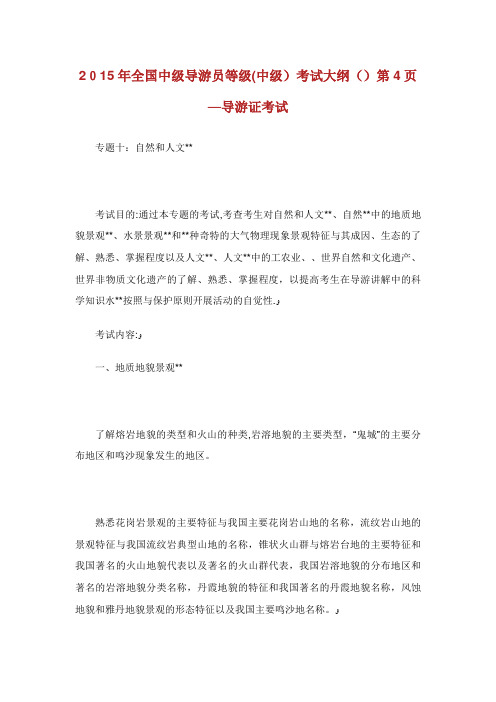
2015年全国中级导游员等级(中级)考试大纲()第4页—导游证考试专题十:自然和人文**考试目的:通过本专题的考试,考查考生对自然和人文**、自然**中的地质地貌景观**、水景景观**和**种奇特的大气物理现象景观特征与其成因、生态的了解、熟悉、掌握程度以及人文**、人文**中的工农业、、世界自然和文化遗产、世界非物质文化遗产的了解、熟悉、掌握程度,以提高考生在导游讲解中的科学知识水**按照与保护原则开展活动的自觉性.ﻭ考试内容:ﻭ一、地质地貌景观**了解熔岩地貌的类型和火山的种类,岩溶地貌的主要类型,“鬼城”的主要分布地区和鸣沙现象发生的地区。
熟悉花岗岩景观的主要特征与我国主要花岗岩山地的名称,流纹岩山地的景观特征与我国流纹岩典型山地的名称,锥状火山群与熔岩台地的主要特征和我国著名的火山地貌代表以及著名的火山群代表,我国岩溶地貌的分布地区和著名的岩溶地貌分类名称,丹霞地貌的特征和我国著名的丹霞地貌名称,风蚀地貌和雅丹地貌景观的形态特征以及我国主要鸣沙地名称。
ﻭ掌握花岗岩山地和石块景观、流纹岩山地景观的原因以及熔岩洞与岩溶洞机理的差别,锥状火山、火山群的过程及独特的景观特征,岩溶地貌不同类别所景观的差别与成因,丹霞地貌的地质基础与外在条件,“鬼城"的以及构成风蚀地貌和雅丹地貌的不同以及产生沙鸣现象的几种学说。
二、水景景观**了解地热水与温泉的区别和世界涌潮的主要发生地。
熟悉泉的类型、门类及世界上和我国涌泉与喷泉分布的著名地区,温泉的类型和对的主要功能以及湖汐景观的形态特征。
ﻭ掌握喷泉与涌泉的异同及其不同的成因,温泉的原因及我国著名温泉的名称,瀑布的四大原因以及我国和世界代表性瀑布,潮汐景观的原因和我国钱塘江大潮壮观景象的原因,地表水体呈现不同色彩的成因以及**和黄龙景区的水景形态特征与的原因。
ﻭ三、奇特的大气物理现象ﻭ了解蜃景、霞与虹的概念,我国大气物理现象所的著名景观及其所在地.ﻭ熟悉我国云海、云瀑、霞景观与虹景观的主要特征,佛光发生的环境,蜃景的类型以及极光的类型、景观特征。
旅游中级英语(一)
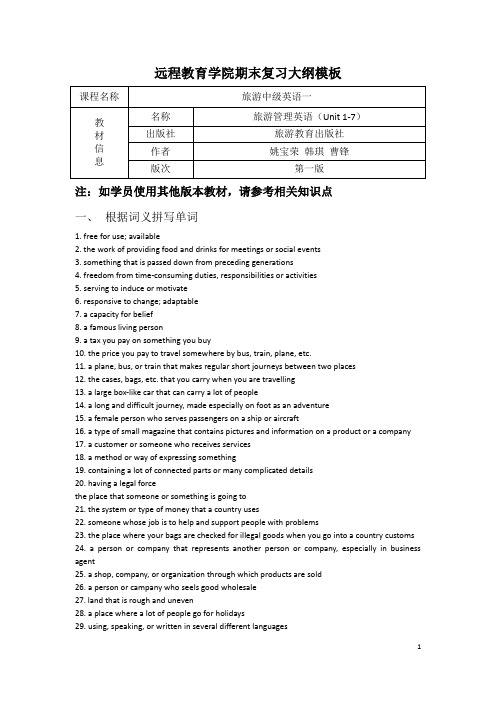
远程教育学院期末复习大纲模板注:如学员使用其他版本教材,请参考相关知识点一、根据词义拼写单词1. free for use; available2. the work of providing food and drinks for meetings or social events3. something that is passed down from preceding generations4. freedom from time-consuming duties, responsibilities or activities5. serving to induce or motivate6. responsive to change; adaptable7. a capacity for belief8. a famous living person9. a tax you pay on something you buy10. the price you pay to travel somewhere by bus, train, plane, etc.11. a plane, bus, or train that makes regular short journeys between two places12. the cases, bags, etc. that you carry when you are travelling13. a large box-like car that can carry a lot of people14. a long and difficult journey, made especially on foot as an adventure15. a female person who serves passengers on a ship or aircraft16. a type of small magazine that contains pictures and information on a product or a company17. a customer or someone who receives services18. a method or way of expressing something19. containing a lot of connected parts or many complicated details20. having a legal forcethe place that someone or something is going to21. the system or type of money that a country uses22. someone whose job is to help and support people with problems23. the place where your bags are checked for illegal goods when you go into a country customs24. a person or company that represents another person or company, especially in business agent25. a shop, company, or organization through which products are sold26. a person or campany who seels good wholesale27. land that is rough and uneven28. a place where a lot of people go for holidays29. using, speaking, or written in several different languages30. likely to happen31. a large box-like car that can carry a lot of people二、单项选择:三、正误判断:1.The value of “balance of life”in Indonesia is positive to the eco-tourismdevelopment in this country.印度尼西亚“生命平衡”的价值观对于该国生态旅游发展是有积极作用的。
导游考试大纲

导游考试大纲导游考试大纲是指导游员进行考试准备的指南,它包括了考试的内容、要求、形式和考试的具体要点等。
下面是一个导游考试大纲的相关参考内容:一、考试内容1.导游基本知识:包括导游行业的发展历程、导游的职责和角色、导游礼仪、导游应具备的素质等。
2.旅游地理知识:包括国内外著名旅游景点的地理位置、历史背景、文化特色、自然资源等。
3.历史文化知识:包括国内外历史名人、历史事件、历史文化遗产等相关知识。
4.旅游法律法规:包括旅游法、导游管理条例、旅游安全相关法规等。
5.导游服务技巧:包括引导游客参观游览的方式方法、解答游客问题的技巧、处理突发事件和投诉的方法等。
二、考试要求1.全面掌握考试内容:考生需要对导游基本知识、旅游地理、历史文化、法律法规和导游服务技巧等方面的内容进行全面的学习和理解。
2.语言表达能力:导游需要具备良好的口头表达能力,考生需要通过写作、演讲等方式,展示自己流畅的语言能力。
3.知识串联能力:考生需要将各个知识点进行联结,形成一个整体的旅游知识网络,能够灵活运用知识。
4.应变能力:考生需要具备一定的逻辑思维能力和处理突发情况的能力,即时正确地应对各种问题和挑战。
三、考试形式1.笔试:主要包括单选题、多选题、问答题等形式,用以考察考生的知识掌握程度和理解能力。
2.口试:主要通过口头回答问题、模拟导游讲解等形式,考察考生的交流能力、语言表达能力和导游服务技巧。
四、考试要点1.重点关注国内外著名旅游景点的地理位置、历史背景、文化特色等方面的知识。
2.熟知导游的职责和角色,包括在旅游行程中的引导、安全保障、文化讲解等。
3.了解旅游法律法规,特别是与导游服务相关的法规条例,如导游管理条例、旅游投诉处理办法等。
4.学习导游礼仪,掌握与游客沟通的技巧,提供专业高效的服务。
5.进行大量的实践训练,熟练掌握导游服务技巧,灵活运用各种解决问题的方法。
综上所述,导游考试大纲的相关参考内容包括了考试的内容、要求、形式和考试的具体要点等。
《全国导游资格考试大纲》《全国中级、高级导游等级考试大纲》(一)

《全国导游资格考试大纲》《全国中级、高级导游等级考试大纲》(一)导游是旅游产业中至关重要的一环。
导游的知识水平和技能水平不仅直接影响游客旅游体验,也影响整个旅游产业的发展。
因此,国家规定了《全国导游资格考试大纲》和《全国中级、高级导游等级考试大纲》以约束和规范导游行为,提高导游素质。
一、导游资格考试大纲1.内容及考试形式《全国导游资格考试大纲》共分为四部分,分别是旅游业务知识、外语、导游实务和礼仪,通过笔试和口试的方式进行考试。
其中,旅游业务知识包括文化、历史,地理,旅游管理和导游法规等;外语考试以英语、法语、德语、日语、俄语、西班牙语、韩语、阿拉伯语、葡萄牙语等考试种类。
2.考试难度导游资格考试属于国家统一考试,其考试难度也随着旅游行业的发展而不断提高,考试难度已成为众所周知的实际情况。
考生不仅要有扎实的旅游业务知识和外语水平,还需要具备了解和掌握当前旅游市场发展趋势和市场需求的能力。
3.通过考试的实际意义通过《全国导游资格考试大纲》的考试是导游执业的“敲门砖”,也是导游行业中最基本的职业认证。
只有通过考试,才有资格领取《导游证》。
同时,导游资格证持有人还能享受多种职业优待,如在旅游景区免费参观、索取各种旅游信息等。
二、中级、高级导游等级考试大纲1.内容及考试形式《全国中级、高级导游等级考试大纲》则分级别考试,分为中级导游和高级导游考试。
考试内容主要包括旅游业务知识、外语、导游实务和礼仪,通过笔试和口试的方式考试。
其中,旅游业务知识包括文化、历史、旅游管理等;外语考试依旧以英语、法语、德语、日语、俄语等为主,同时还要求考生具备独立对话和表达能力;导游实务则要求考生具备优秀的解说能力和紧急处理能力;礼仪考试则要求考生具备得体规范的职业形象和表现能力。
2.考试难度中级、高级导游等级考试难度相比于导游资格考试的考试难度更高,主要在于考查考生的实际能力和综合素质。
考生的综合素质主要包括男女外语交流、导游口才表达、旅游路线规划等多项干练实用技能。
全国中级导游员等级《外语》考试大纲(试行)-导游证考试.doc
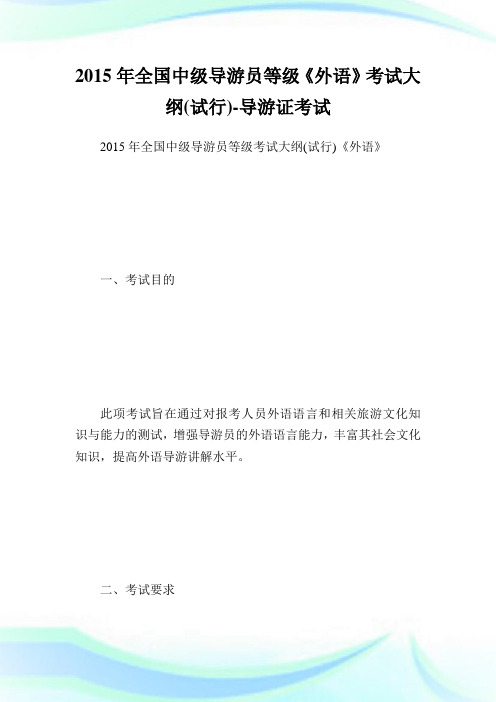
2015年全国中级导游员等级《外语》考试大纲(试行)-导游证考试2015年全国中级导游员等级考试大纲(试行)《外语》一、考试目的此项考试旨在通过对报考人员外语语言和相关旅游文化知识与能力的测试,增强导游员的外语语言能力,丰富其社会文化知识,提高外语导游讲解水平。
二、考试要求此项考试要求考生在规定时间内,不使用任何形式的辞(字)典,独立用所报考种语完成相关考题。
三、考试内容、方式考试内容包括外语语言水平、中国文化知识、导游实践应用。
考试形式为闭卷笔试,考试时间为120分钟。
四、试题结构(一)命题原则:考试命题以本大纲为依据,检验导游员对相关知识的理解及应用能力。
(二)试题结构:1.能力结构试题主要检验导游员进行两种语言转换的基本能力(包括理解原文内容的能力和语言表达及写作能力等)。
2.难度结构试题难度分为较易、适中、较难三个层次。
较易试题部分主要测试导游员对所报考语种的基本知识和文化常识的了解情况;适中试题主要检查导游员双语转换的基本技巧和对相关文化主题的掌握程度,以及从事导游翻译的基本能力;试题较难部分测试导游员对相关语言与文化知识的旅游活动中的应用能力。
整套试题较易、适中和较难的比例为3:5:2。
3.题型结构试题类型分为:词汇翻译、段落翻译、旅游应用文写作、文化专题讲解词写作四部分。
(具体要求见下表)中级导游员外语考试水平要求及试题结构认知词汇6,500—7,000个,且能正确熟练笔头应用其中的3,500—4,000个及其最基本的搭配。
词汇类型包括日常生活、中国文化现象、新中国现代化建设、旅游活动共四大类。
题型包括单词和词组翻译。
此部分由30个单词和词组组成。
翻译下列单词和词组:1.驿站2.维吾尔语3.东南亚国家联盟4.丝绸之路经济带5.功夫茶……基本掌握翻译常用技巧和中外两种语言的差异,能完成中等程度的中译外段落的翻译,速度为每小时280—300字,译文要求内容忠实、语言通顺,符合目的语的表达习惯。
[旅游中级英语(一二)]复习资料
![[旅游中级英语(一二)]复习资料](https://img.taocdn.com/s3/m/986980930242a8956bece4aa.png)
远程教育学院期末复习大纲模板注:如学员使用其他版本教材,请参考相关知识点一、根据词义拼写单词1. free for use; available disposable2. the work of providing food and drinks for meetings or social events catering3. something that is passed down from preceding generations heritage4. freedom from time-consuming duties, responsibilities or activities leisure5. serving to induce or motivate incentive6. responsive to change; adaptable flexible7. a capacity for belief credibility8. a famous living person celebrity9. a tax you pay on something you buy duty10. the price you pay to travel somewhere by bus, train, plane, etc. fare11. a plane, bus, or train that makes regular short journeys between two places shuttle12. the cases, bags, etc. that you carry when you are travelling luggage13. a large box-like car that can carry a lot of people van14. a long and difficult journey, made especially on foot as an adventure trek15. a female person who serves passengers on a ship or aircraft stewardess16. a type of small magazine that contains pictures and information on a product or a company brochure17. a customer or someone who receives services client18. a method or way of expressing something medium19. containing a lot of connected parts or many complicated details elaborate20. having a legal force validthe place that someone or something is going to destination21. the system or type of money that a country uses currency22. someone whose job is to help and support people with problems counsellor23. the place where your bags are checked for illegal goods when you go into a country customs24. a person or company that represents another person or company, especially in business agent25. a shop, company, or organization through which products are sold outlet26. a person or campany who seels good wholesale wholesaler27. land that is rough and uneven rugged28. a place where a lot of people go for holidays resort29. using, speaking, or written in several different languages multilingual30. likely to happen prospective31. a large box-like car that can carry a lot of people van二、单项选择:1. A conventioneer may include in his agenda sometime for__.A. sightseeingB. working答案:A 有时参加会议者也会把观光列入日程2. One primary motivation for traveling, according to many, is to have a __.A. different experienceB. routine activity答案:A旅游最主要的动机就是不同的体验3. A tourist may wish to visit an Indian Reservation in order to observe the different life styles, and this kind of activity could be a kind of __.A. recreational tourismB. ethnic tourism答案:B 到印度观察当地人不同生活方式的旅游列为民族人文旅游范畴4. The word Shangri-la means__.A. a dream landB. a spiritual land of peace and perfectionC.UtopiaD. A religious place答案:B 香格里拉的字面含义是平静完美的精神世界5. China’s Zhongdian County is renamed as Shangri-la because of __in this area.A.the diverse natural featuresB.the rare plants and animalsC.the intact natural resources and geological featuresD.the ecological perfection and cultural diversity答案:D 把中国的中甸县命名为香格里拉是因为这个区域完美的生态环境和多样的文化6. WWF’s Global 200 Ecoregions is __.A. a science-based ranking of the world’s most biologically outstanding habitats.B. a science-based ranking of place for the world’s most endangered animalsC.the world’s most appropriate place for human beingsD.the world’s most appropriate place for animals答案:A WWF 公布的全球200个生态地区是以科学的方式评选出的全世界生态最优栖息地。
英语导游证考试面试问答之导游规范
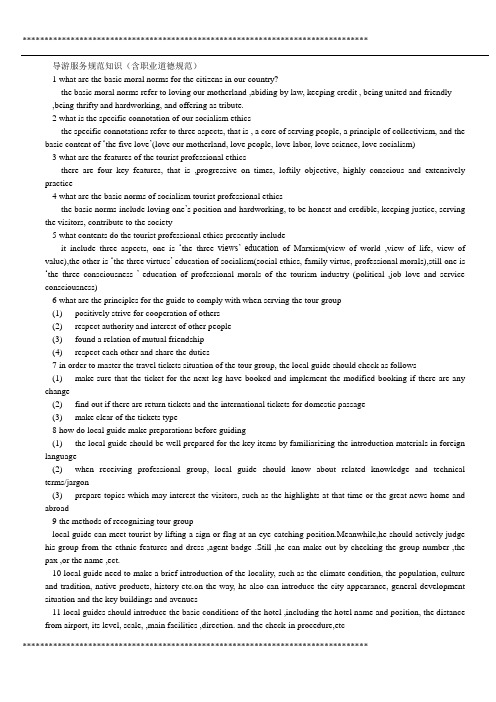
导游服务规范知识(含职业道德规范)1 what are the basic moral norms for the citizens in our country?the basic moral norms refer to loving our motherland ,abiding by law, keeping credit , being united and friendly,being thrifty and hardworking, and offering as tribute.2 what is the specific connotation of our socialism ethicsthe specific connotations refer to three aspects, that is , a core of serving people, a principle of collectivism, and the basic content of ‘the five love’(love our motherland, love people, love labor, love science, love socialism)3 what are the features of the tourist professional ethicsthere are four key features, that is ,progressive on times, loftily objective, highly conscious and extensively practice4 what are the basic norms of socialism tourist professional ethicsthe basic norms include loving one’s position and hardworking, to be honest and credible, keeping justice, serving the visitors, contribute to the society5 what contents do the tourist professional ethics presently includeit include three aspects, one is ‘the three views’ education of Marxism(view of world ,view of life, view of value),the other is ‘the three virtues’ education of socialism(social ethics, family virtue, professional morals),still one is ‘the three consciousness ’education of professional morals of the tourism industry (political ,job love and service consciousness)6 what are the principles for the guide to comply with when serving the tour group(1)positively strive for cooperation of others(2)respect authority and interest of other people(3)found a relation of mutual friendship(4)respect each other and share the duties7 in order to master the travel tickets situation of the tour group, the local guide should check as follows(1)make sure that the ticket for the next leg have booked and implement the modified booking if there are any change(2)find out if there are return tickets and the international tickets for domestic passage(3)make clear of the tickets type8 how do local guide make preparations before guiding(1)the local guide should be well prepared for the key items by familiarizing the introduction materials in foreign language(2)when receiving professional group, local guide should know about related knowledge and technical terms/jargon(3)prepare topics which may interest the visitors, such as the highlights at that time or the great news home and abroad9 the methods of recognizing tour grouplocal guide can meet tourist by lifting a sign or flag at an eye-catching position.Meanwhile,he should actively judge his group from the ethnic features and dress ,agent badge .Still ,he can make out by checking the group number ,the pax ,or the name ,ect.10 local guide need to make a brief introduction of the locality, such as the climate condition, the population, culture and tradition, native products, history etc.on the way, he also can introduce the city appearance, general development situation and the key buildings and avenues11 local guides should introduce the basic conditions of the hotel ,including the hotel name and position, the distance from airport, its level, scale, ,main facilities ,direction. and the check-in procedure,etc12 a welcome speech include aspects as follows(1)welcome the guests on behalf of the agent ,driver and me(2)introduce my name ,the company I’m working for ,and the driver to visitors(3)express my sincere wishes to serve them and hope they have a good time13 the local guide should master the room numbers of the leader ,national guide and visitors after checking in the hotel.Meanwhile he should tell them how to keep touch with him.14 before leading the guests into their rooms, the local guide should introduce the restaurant site, the dinner time and some related regulations. when they use meal for the first time there, guide should actively lead them and tell the captain their special demands15 having finished the job of that day, local guide should discuss with the leader about the time for waking-up and ask the leader to tell them. Meanwhile, he should inform the general lines or the floor attendant desk to make the morning call16 the local guide can restate the arrangement ,including the site and time for meal and how long it will take to the attraction, or the great news at home and abroad.also,he can talk about the local customs, answer the visitors’ questions or make a brief introduction of the attraction. if it is a long journey, the guide can organize some exciting games17 before arrival of the atrration ,the local guide should remind the visitors of the bus, such as its number ,color , sign, parking site,leaving time.ect.before the map, guide should instruct the visiting route ,the time needed, the gathering time and place ect.still,the visitors should be told the notes during the visit. beginning the sightseeing ,the local guide need to tell them the attention notes18 the local guide can review the visiting items of that day and tell some additional introductions if necessary.on the other way back guide need to introduce the en-route sights .before getting off the bus ,guide should forecast the program ,starting time and gathering place of the night or the next day. Remember to remind them of taking along with their belongs when getting off the bus19(1)report it to the related department of the agent in time and try best to satisfy their reasonable requirements (2)if there exist some items needing extra charge, guide should tell the leader or guests beforehand and charge by regulation(3) if there do exist some requirements that are too difficult to meet, guide should elaborate and persuade them patiently20(1)check the transportation tickets(2)discuss the times for luggage-out ,the gathering and starting-off ,morning call and having breakfast(3) assist the hotel with the related bills(4)return the documents of the travelers(5)if the leading cadres will be present to see them off, local guide should well organize the farewell job seriously.21(1)during the visit, the guide should take care of the security of the visitors and stay with them all the time .(2)constantly count the numbers of visitors along with the national guide and leader ,avoiding the visitors’ getting lost22.having finished the hand-over procedure ,the local guide should check the amounts of the luggage together with the leader and national guide. after examining if the luggage is locked ,firmly tied or damaged, deliver them to bellman and fill in shipment form23 A farewell speech should include the following contents(1)review the trip and express heartfelt thanks for visitors cooperation(2)express the feelings of parting with the tour friends(3)sincerely ask the visitors for complaints and suggestions on the whole reception job(4)if there are something discontent during the trip, guide can take this opportunity to apologize to visitors again(5)send best regards to them all24if it is an outbound tour group, local guide can leave after the tourists enter into the isolated area for departureif it is an inbound one, local guide mustn’t leave until the plane ,train, or the ship have started off25(1)the introduction of the attractions should be in good proportion of details and brief and should be vivid(2)local guide should well distribute the time for visiting and rest, especially for the weak26(1)As one important part of tourist’s activities, local guide should strictly carry out the reception plan by leading tourists to the appointed shops and avoiding arranging too many shoppings(2)before shopping, the local guide should introduce the local products and teach them how to distinguish ,how to consign and how long it will stay for shopping(3)the local guide should alert guests not to be cheated when they are forcedly drawed by peddlers(4)when the shops don’t offer standard service by underselling fake products, local guide should defend the benefits of guests27(1)one day before the departure, local guide should check the tickets for the tour group, including the names, the flight number, timeand the port ect.if there is any change ,guide should make sure that the operation of the agent have informed the next leg(2)local guide should assist the leader with the outbound tickets72hours before departure28 Generally speaking ,the local guide don’t keep the travel documents and should immediately return to the visitors or leader after use .one day before departure, local guide should examine his own things to check no documents left and remind them to bring their passports and declaration forms for the customs inspection29 what will the national guide do after entering the hotel(1)National guide should positively assist the leader to check the visitors in the hotel(2)Master the name list of the room distribution and the room number of the leader for mutual contact(3)lead visitors to their rooms warmly(4)take responsibility to attend the tour group if the local guide d oesn’t live in the hotel(5)get the phone number of the reception desk and the way to keep touch with local guide30 how do the national guide supervise the reception quality of each leg(1)if there are obviously repetitions with the last legs on the arrangement ,the national guide should advise the local guide to make some necessary adjustments(2)if there are complaints or suggestions on the local reception, national guide should tell the local guide sincerely and report to the agent if necessary31 the national guide should link the leader and local guide or the visitors and the local guide for coordination.Still, he should communicate with every legs of the visit to inform the situation for implementing the next reception32 what service do the national guide offer en-route(1)when by plane, national guide should actively get the supports of the stewards to service the visitors(2)remind the visitors to take care of their things and keep safe(3)organize the entertainments and assist to arrange the life of the visitors(4)take care of the checks for transportation and give them to the next local guide after arrival33 what will the national guide do at the final leg of the visit(1)when trip ends, national guide should remind the visitors to take along with their valuables and documents(2)to ask the visitors for complaints and suggestions on the whole reception job(3)bid farewell ,expressing thanks to the visitors for their cooperation’s and welcome their next visit34 the daily records of the national guide include(1)the basic situations of the tour group(2)the schedule and transportation(3)the reception quality on each leg(4)the problems and the settling process(5)the reflection from visitors and improvement degree35what principles should the leader comply with when checking and discussing the reception plan with the local guidethe leader need to abide by two principles(1)when local guide need to alter the routing ,leader should insist that the schedule can be adjusted without reducing items .what is more, report to the domestic agent if necessary.(2)If the local guide recommends self-paying items, leader should ask for the opinions of all the visitors beforehand36 when the visitor orally sue against guide, how to handle(1)listen attentively. no matter there is proper reason or not ,guide don’t plea immediately(2)to survey and verify. The guide should report the problem to the agent and related tourism department immediately, and make survey seriously(3)properly deal with the problem. having verified the reason, the guide should apologize to the prosecutor objectively(4)continue to service. after handling ,the guide should thank the visitor and go on offering warm and considerate service37 the four principles of guiding language refer that(1)correctness, as an basic principle it refer to speaking in standard language(2)to be clear embody that the guiding language should be scientific(3)To be vivid reflects that the guiding language is artistic and interesting(4)To be adaptability it means that using language should depend on specific occasion.38 the eight key factors of guiding contents refer to speaking with the real material, proof, reason ,passion , good manner, being magical ,interesting and metaphorical39 what principles should a guide comply with during guidingthe guide should comply with the following principles(1)To be planned. exactly speaking, guide should have an complete plan of time arrangement when guiding the visitors(2)To be objective.(3)To be focalization. that is ,offering service acceding to the practical situation.(4)To be adaptability. it means that guiding work should depend on the personal conditions .40 In the terms of purchasing and consuming forms, what are the main differences between the independent tour and package tour?Compared with the package tour ,there are five key differences on the following aspects(1)The plan and arrangement of tour itinerary(2)the charge pattern(3)the price(4)the degree of freedom(5)the amount of the travelers41 In the terms of the production and sales of travel products, what are the main differences between the independent tour and package tour?Compared with the package tour ,there are five key differences(1)less amount of sales(2)more times of sales(3)shorter reservation period(4)more requirements(5)more changes42 what are the specific demands for the guide serving the independent travelerthe demands are as follows(1)high efficient reception service(2)high quality guide service(3)fairly independent working ability and speaking ability43 what are the specific demands for meeting the independent traveler ahead of time?The guide should wait for meeting visitors 20minutes before their arrival by air.Or meeting visitors at the station platform 30minutes before their arrival by train44 what are the main motivations of the touriststhere are four main motivations ,that is ,the health motivaton,the culture motivation, the social relation motivation and the prestige motivation.45 what are the common methods to offer mental servicethere are five main methods as follows:first ,to respect the touristssecond, keep serving tourists with smilethird, learn to speak in polite and gentle languagealso, to make friends with the touristsstill, to offer personal service。
2023年旅游导游资格考试大纲
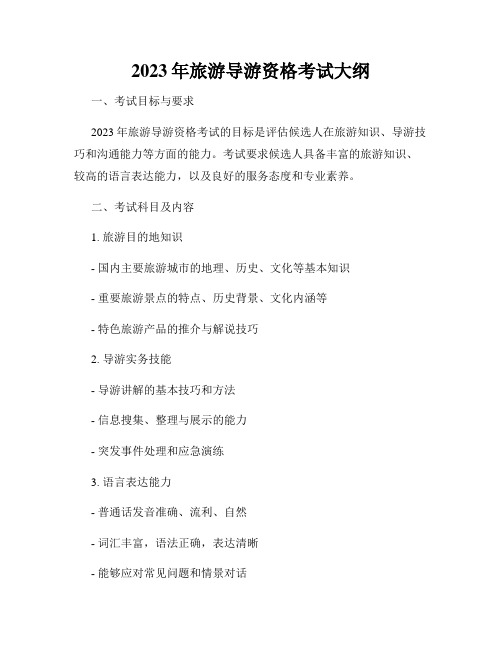
2023年旅游导游资格考试大纲一、考试目标与要求2023年旅游导游资格考试的目标是评估候选人在旅游知识、导游技巧和沟通能力等方面的能力。
考试要求候选人具备丰富的旅游知识、较高的语言表达能力,以及良好的服务态度和专业素养。
二、考试科目及内容1. 旅游目的地知识- 国内主要旅游城市的地理、历史、文化等基本知识- 重要旅游景点的特点、历史背景、文化内涵等- 特色旅游产品的推介与解说技巧2. 导游实务技能- 导游讲解的基本技巧和方法- 信息搜集、整理与展示的能力- 突发事件处理和应急演练3. 语言表达能力- 普通话发音准确、流利、自然- 词汇丰富,语法正确,表达清晰- 能够应对常见问题和情景对话4. 服务态度与专业素养- 文明礼貌、亲和热情的服务态度- 专业形象的外表仪态和言行举止- 感知候选人情感智商和社交情商的综合素质三、考试形式与评分标准1. 考试形式- 笔试:包括选择题、填空题、简答题等,考察候选人对旅游知识的理解与运用能力。
- 口试:模拟导游实际工作情境,对候选人的语言表达能力、交流技巧和应对能力进行评估。
2. 评分标准- 笔试按照题目要求和答案准确度进行评分,得分转化为百分制。
- 口试评分主要考虑语言表达流利度、信息正确性、态度和沟通能力等方面。
四、备考建议1. 提前了解考试大纲:仔细阅读考试大纲,明确考试科目内容,合理安排备考时间和学习重点。
2. 多方面积累旅游知识:通过阅读旅游相关书籍、杂志、报纸等,增加旅游目的地的知识储备。
3. 参加培训班或自主学习:参加专业导游培训班,学习导游实务技能和服务礼仪,并刻意练习口头表达能力。
4. 多进行模拟练习:利用模拟题库和模拟考试平台进行练习和实践,加深对考试形式和题目类型的熟悉。
5. 注意语言表达和形象修养:练习口语表达,注意语音语调和掌握常用表达,同时注重形象修养和仪态训练。
6. 注重综合素质塑造:发展自身的情感智商和社交情商,增强服务态度、人际沟通和应对突发情况能力。
中级导游员《英语》考试大纲
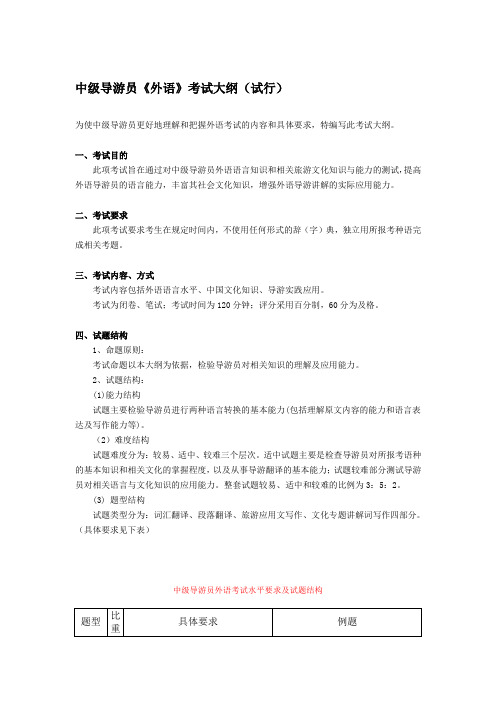
中级导游员《外语》考试大纲(试行)
为使中级导游员更好地理解和把握外语考试的内容和具体要求,特编写此考试大纲。
一、考试目的
此项考试旨在通过对中级导游员外语语言知识和相关旅游文化知识与能力的测试,提高外语导游员的语言能力,丰富其社会文化知识,增强外语导游讲解的实际应用能力。
二、考试要求
此项考试要求考生在规定时间内,不使用任何形式的辞(字)典,独立用所报考种语完成相关考题。
三、考试内容、方式
考试内容包括外语语言水平、中国文化知识、导游实践应用。
考试为闭卷、笔试;考试时间为120分钟;评分采用百分制,60分为及格。
四、试题结构
1、命题原则:
考试命题以本大纲为依据,检验导游员对相关知识的理解及应用能力。
2、试题结构:
(1)能力结构
试题主要检验导游员进行两种语言转换的基本能力(包括理解原文内容的能力和语言表达及写作能力等)。
(2)难度结构
试题难度分为:较易、适中、较难三个层次。
适中试题主要是检查导游员对所报考语种的基本知识和相关文化的掌握程度,以及从事导游翻译的基本能力;试题较难部分测试导游员对相关语言与文化知识的应用能力。
整套试题较易、适中和较难的比例为3:5:2。
(3) 题型结构
试题类型分为:词汇翻译、段落翻译、旅游应用文写作、文化专题讲解词写作四部分。
(具体要求见下表)
中级导游员外语考试水平要求及试题结构。
2020年全国导游资格考试大纲和中、高级导游等级考试大纲
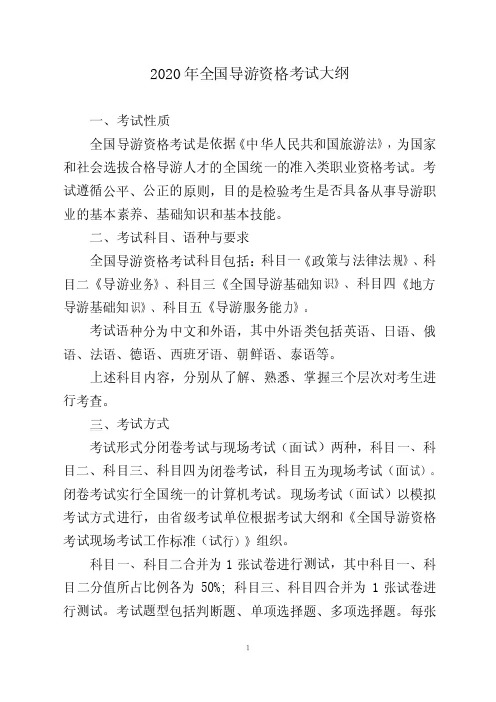
2020年全国导游资格考试大纲一、考试性质全国导游资格考试是依据《中华人民共和国旅游法》,为国家和社会选拔合格导游人才的全国统一的准入类职业资格考试。
考试遵循公平、公正的原则,目的是检验考生是否具备从事导游职业的基本素养、基础知识和基本技能。
二、考试科目、语种与要求全国导游资格考试科目包括:科目一《政策与法律法规》、科目二《导游业务》、科目三《全国导游基础知识》、科目四《地方导游基础知识》、科目五《导游服务能力》。
考试语种分为中文和外语,其中外语类包括英语、日语、俄语、法语、德语、西班牙语、朝鲜语、泰语等。
上述科目内容,分别从了解、熟悉、掌握三个层次对考生进行考查。
三、考试方式考试形式分闭卷考试与现场考试(面试)两种,科目一、科目二、科目三、科目四为闭卷考试,科目五为现场考试(面试)。
闭卷考试实行全国统一的计算机考试。
现场考试(面试)以模拟考试方式进行,由省级考试单位根据考试大纲和《全国导游资格考试现场考试工作标准(试行)》组织。
科目一、科目二合并为1张试卷进行测试,其中科目一、科目二分值所占比例各为50%;科目三、科目四合并为1张试卷进行测试。
考试题型包括判断题、单项选择题、多项选择题。
每张试卷考试时间为90分钟,含165题,共100分,其中判断题40题(每题0.5分,共20分),单项选择题90题(每题0.5分,共45分),多项选择题35题(每题1分,共35分)。
科目五考试中文类考生每人不少于15分钟,备考旅游景区不少于12个;外语类考生每人不少于25分钟,备考旅游景区不少于5个。
考试成绩采用百分制,中文类分值比例为:礼貌礼仪占5%,语言表达占20%,景点讲解占45%,导游服务规范占10%,应变能力占10%,综合知识占10%;外语类分值比例为:礼貌礼仪占5%,语言表达占25%,景点讲解占30%,导游服务规范占10%,应变能力占5%,综合知识占5%,口译占20%。
四、各科目考试大纲科目一《政策与法律法规》考试大纲(-)考试目的考查考生对党和国家的基本国策、根本制度、根本任务、重大方针政策以及与旅游业发展相关的法律、法规、方针政策的了解、熟悉和掌握程度。
中级导游证考试教材
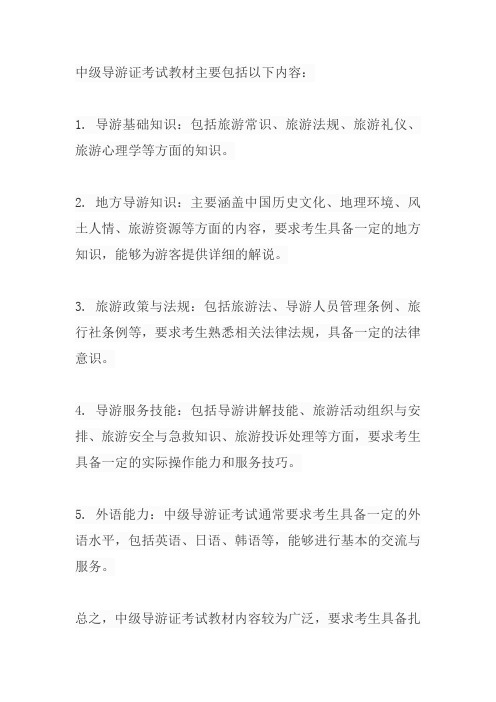
中级导游证考试教材主要包括以下内容:
1. 导游基础知识:包括旅游常识、旅游法规、旅游礼仪、旅游心理学等方面的知识。
2. 地方导游知识:主要涵盖中国历史文化、地理环境、风土人情、旅游资源等方面的内容,要求考生具备一定的地方知识,能够为游客提供详细的解说。
3. 旅游政策与法规:包括旅游法、导游人员管理条例、旅行社条例等,要求考生熟悉相关法律法规,具备一定的法律意识。
4. 导游服务技能:包括导游讲解技能、旅游活动组织与安排、旅游安全与急救知识、旅游投诉处理等方面,要求考生具备一定的实际操作能力和服务技巧。
5. 外语能力:中级导游证考试通常要求考生具备一定的外语水平,包括英语、日语、韩语等,能够进行基本的交流与服务。
总之,中级导游证考试教材内容较为广泛,要求考生具备扎
实的旅游知识、地方知识、服务技能和外语能力,以满足导游工作的需求。
2006年中级导游考试《导游知识专题》试题(暂缺答案)
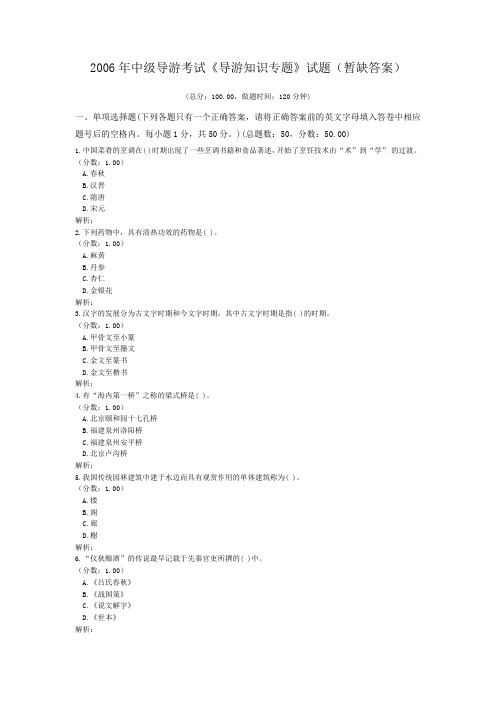
2006年中级导游考试《导游知识专题》试题(暂缺答案)(总分:100.00,做题时间:120分钟)一、单项选择题(下列各题只有一个正确答案,请将正确答案前的英文字母填入答卷中相应题号后的空格内。
每小题1分,共50分。
)(总题数:50,分数:50.00)1.中国菜肴的烹调在( )时期出现了一些烹调书籍和食品著述,开始了烹饪技术由“术”到“学” 的过渡。
(分数:1.00)A.春秋B.汉晋C.隋唐D.宋元解析:2.下列药物中,具有清热功效的药物是( )。
(分数:1.00)A.麻黄B.丹参C.杏仁D.金银花解析:3.汉字的发展分为古文字时期和今文字时期,其中古文字时期是指( )的时期。
(分数:1.00)A.甲骨文至小篆B.甲骨文至籀文C.金文至篆书D.金文至楷书解析:4.有“海内第一桥”之称的梁式桥是( )。
(分数:1.00)A.北京颐和园十七孔桥B.福建泉州洛阳桥C.福建泉州安平桥D.北京卢沟桥解析:5.我国传统园林建筑中建于水边而具有观赏作用的单体建筑称为( )。
(分数:1.00)A.楼B.阁C.廊D.榭解析:6.“仪狄酿酒”的传说最早记载于先秦官吏所撰的( )中。
(分数:1.00)A.《吕氏春秋》B.《战国策》C.《说文解字》D.《世本》解析:7.已故的浙江农业大学茶学专家庄晚芳教授提出中国茶道应是( )。
(分数:1.00)A.廉、美、和、敬B.廉、美、理、敬C.理、清、融、敬D.廉、清、和、敬解析:8.藏传佛教有四大教派,俗称红教、花教、白教、黄教,它们的宗派名称依次是( )。
(分数:1.00)A.宁玛派、萨迦派、噶举派、格鲁派B.格鲁派、宁玛派、萨迦派、噶举派C.宁玛派、噶举派、萨迦派、格鲁派D.萨迦派、宁玛派、格鲁派、噶举派解析:9.用考试方法录用人才的“武举制”始于( )。
(分数:1.00)A.汉代B.唐代C.宋代D.明代解析:10.中国武术发展到( )时期出现了打擂比武的“露台争交”。
(分数:1.00)A.秦汉B.隋唐C.宋元D.明清解析:11.中国最大的伊斯兰教礼拜寺是( )。
旅游饭店英语中级考试大纲
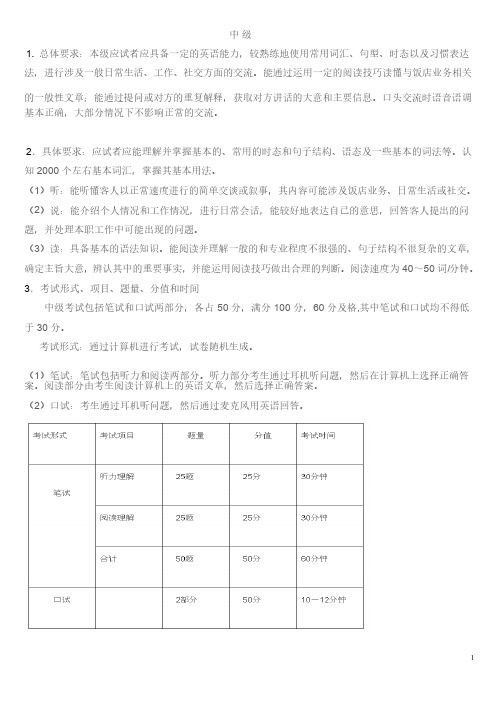
中级1. 总体要求:本级应试者应具备一定的英语能力,较熟练地使用常用词汇、句型、时态以及习惯表达法,进行涉及一般日常生活、工作、社交方面的交流。
能通过运用一定的阅读技巧读懂与饭店业务相关的一般性文章;能通过提问或对方的重复解释,获取对方讲话的大意和主要信息。
口头交流时语音语调基本正确,大部分情况下不影响正常的交流。
2.具体要求:应试者应能理解并掌握基本的、常用的时态和句子结构、语态及一些基本的词法等。
认知2000个左右基本词汇,掌握其基本用法。
(1)听:能听懂客人以正常速度进行的简单交谈或叙事,其内容可能涉及饭店业务、日常生活或社交。
(2)说:能介绍个人情况和工作情况,进行日常会话,能较好地表达自己的意思,回答客人提出的问题,并处理本职工作中可能出现的问题。
(3)读:具备基本的语法知识。
能阅读并理解一般的和专业程度不很强的、句子结构不很复杂的文章,确定主旨大意,辨认其中的重要事实,并能运用阅读技巧做出合理的判断。
阅读速度为40~50词/分钟。
3.考试形式、项目、题量、分值和时间中级考试包括笔试和口试两部分,各占50分,满分100分,60分及格,其中笔试和口试均不得低于30分。
考试形式:通过计算机进行考试,试卷随机生成。
(1)笔试:笔试包括听力和阅读两部分。
听力部分考生通过耳机听问题,然后在计算机上选择正确答案。
阅读部分由考生阅读计算机上的英语文章,然后选择正确答案。
(2)口试:考生通过耳机听问题,然后通过麦克风用英语回答。
笔试-人机考试口试——人机对话附:中级考试题型样题一、笔试第1部分听力理解Part A 提问(听录音)提问(听录音)My name is Jane Smith. Hello, I’m calling to confirm my room reservation. (答题)A. Where are you calling from? B. Of course, madam. C. Sorry, there is no room available, madam. D. What’s your room number, madam? 答案:D Part B 对话(听录音)对话(听录音)W: Good morning. Can I help you? M: Yes. I want to stay here one more night. Q: What do we know about the man? B. He is checking in. (答题)A. He wants to extend his stay. D. He is getting some information. C. He is checking out. 答案:A Part C 短文(听录音)短文(听录音)Welcome to the Grand Hotel. To make your stay as enjoyable as possible, we hope you will use our hotel facilities to the full. Breakfast is served in the dinning -room from 8 to 9 a.m. But if you want your breakfast brought to your room at any time after 7 a.m., please fill out a card and hang it outside on your doorknob. Lunch is served from 12 to 2:30 p.m. and dinner from 7:30 to 9:00 p.m.. Hotel room service operates 24 hours. Hotel bar is open from 12:00 to 2:30 p.m. and 7:00 p.m. to 1:00 a.m.. Hot shop is on the first floor at the right side of the lobby, which is open from 9 a.m. to 5:30 p.m.. Now do questions 1 to 5:1. What service in the hotel is it that operates around the clock? 2. When is the hotel bar open? 3. What would you have to do if you want a snack at 11:00 p.m.? 4. Which of the following is NOT true? 5. What did the passage say about the hotel shop? (答题)1. A. Hotel bar B. Hotel room service C. Hotel shop D. Hotel laundry service 2. A. It opens from 12:00- 2:00 p.m. and 7:30 p.m.-1:00 a.m.. B. It opens from 12:30-2:30 p.m. and 7:00 p.m.-1:00 a.m.. C. It opens from 12:00-2:30 p.m. and 7:00 p.m.-1:00 a.m.. D. It opens from 12:30-2:00 p.m. and 7:00 p.m.-1:00 a.m.. 3. A. Go to the hotel shop. B. Hang a message outside your door. C. Go to the hotel bar. D. Call hotel shop assistants. 4. A. You can have your breakfast in your room. B. Room service is very convenient. C. Lunch is served from 12:00 to 2:30 p.m.. D. Hotel bar service opens 24 hours. 5. A. It’s on the second floor. B. It’s on the left side of the lobby. C. It’s open round the clock. D. It’s open from 9:00 a .m. to 5:30 p.m.. 答案:1. B 2.C 3.B 4.D 5.D 第2部分阅读理解Text AIn order to see that all the activities of the hotel run smoothly and efficiently, the manager carries out routine spot checks, often on a daily basis, of different aspects of the hotel’s operati on. He also deals with unusual problems as they occur. In a large hotel, he coordinates the work of the departmenheads who supervise their respective departments. The manager’s working relationship with these people has a lot to do with the smooth functioning of the hotel. Hiring and training are two other vital responsibilities of the manager. The personality, experience, and technical know-how of every employee in the hotel are matters of importance in a business wherecourtesy is one of the major services. The references given by job applicants are carefully checked l behavior is observed. A watchful eye must be kept and, during the job interview, the applicant’s initiaon their performance after they have been hired. Continuing in-house training programs are necessary in order to maintain the standards of the establishment. . 1. According to this passage, the hotel manager A. usually works in his office B. should have good relations with department heads D. deals with unusual problems every day C. should check every department every day . 2. The overall responsibility of the hotel manager is A. to ensure the smooth operation of the hotel B. t o ensure a good working atmosphere to ensure a good working atmosphere C. to solve unusual problems D. to check different aspects of the hotel’s operation 3. What are the important aspects mentioned here in a staff-hiring program? A. The personality of the staff. B. The work experience of the staff. C. The technical know-how. D. All of the above. . 4. Before a person is hired by the hotel, B. he is checked by the hotel A. he will receive training provided by that hotel D. he should maintain good standards C. he should send in letters of reference . 5. When a person has been hired by the hotel, A. he will definitely receive training B. he should expect that his work is supervised C. he should expect to go to an interview D. he should keep a watchful eye 答案:1. B 2.A 3.D 4.C 5.B 二、口试第1部分自我介绍Describe your normal work in your hotel or study in your school. 第2部分业务问答tell me something about your hotel’s health and recreation facilities? Could you t ell me something about your hotel’s health and recreation facilities? 。
- 1、下载文档前请自行甄别文档内容的完整性,平台不提供额外的编辑、内容补充、找答案等附加服务。
- 2、"仅部分预览"的文档,不可在线预览部分如存在完整性等问题,可反馈申请退款(可完整预览的文档不适用该条件!)。
- 3、如文档侵犯您的权益,请联系客服反馈,我们会尽快为您处理(人工客服工作时间:9:00-18:30)。
中级导游员《外语》考试大纲(试行)为使中级导游员更好地理解和把握外语考试的内容和具体要求,特编写此考试大纲。
一、考试目的此项考试旨在通过对中级导游员外语语言知识和相关旅游文化知识与能力的测试,提高外语导游员的语言能力,丰富其社会文化知识,增强外语导游讲解的实际应用能力。
二、考试要求此项考试要求考生在规定时间内,不使用任何形式的辞(字)典,独立用所报考种语完成相关考题。
三、考试内容、方式考试内容包括外语语言水平、中国文化知识、导游实践应用。
考试为闭卷、笔试;考试时间为120分钟;评分采用百分制,60分为及格。
四、试题结构1、命题原则:考试命题以本大纲为依据,检验导游员对相关知识的理解及应用能力。
2、试题结构:(1)能力结构试题主要检验导游员进行两种语言转换的基本能力(包括理解原文内容的能力和语言表达及写作能力等)。
(2)难度结构试题难度分为:较易、适中、较难三个层次。
适中试题主要是检查导游员对所报考语种的基本知识和相关文化的掌握程度,以及从事导游翻译的基本能力;试题较难部分测试导游员对相关语言与文化知识的应用能力。
整套试题较易、适中和较难的比例为3:5:2。
(3) 题型结构试题类型分为:词汇翻译、段落翻译、旅游应用文写作、文化专题讲解词写作四部分。
(具体要求见下表)中级导游员外语考试水平要求及试题结构中级导游员《导游知识专题》考试大纲(试行)考试方式与题型题量:考试为闭卷、笔试;考试时间为120分钟;评分采用百分制,60分为及格。
包括单选(4项选1)50题(每题1分)、多选(5项选2、3或4)20题(每题1分)、判断15题(每题1分)、简述3题(每题5分)。
专题一:中国传统文化考试目的:通过本专题的考试,检查考生对中国传统文化的特色,中国古代主要思想流派、代表人物和主要思想,中国戏剧的特点、主要剧种、流行地区和代表剧目,中国书法的特色、汉字书体类别、代表人物和著名书法作品,中国绘画的特点、分类、主要流派、代表人物和代表作的了解、熟悉和掌握程度,以提高考生对中国戏剧、中国书法和中国绘画的识别、欣赏能力和导游讲解水平。
考试内容:一、中国传统文化简述了解"中国传统文化"的概念,熟悉中国传统文化的物质、行为、制度、精神(社会意识)四种形式和中国传统文化的六大特色。
二、中国古代思想流派了解夏代之前"公天下"的"禅让"思想,"三易"之名及"儒易"、"道易"和"学理易"、"术数易"的区别,"五行"、"阴阳"学说产生形成的过程以及春秋战国时期名家、农家,"为我"纵横家、阴阳家、杂家等流派,孔子学说和儒家流派的发展演变,老庄思想的主要内容是“无为无不为”的思想方法和魏晋玄学"贵无"、"贵有"理论的实质以及佛教融入中国文化的过程;熟悉"八卦"的创造者,墨家、兵家、法家的创派时间、代表人物及其思想要义,儒家学派的创始人姓名、记录其理论的有关典籍、孔子的认知、教育观和"仁学"的"仁"所包涵的内容、"礼治"的功用、孟子的"民本"、"性善"说和儒家学派在四个发展演变阶段的四种形式,"道"的本质及道家以柔克刚、奇正互变的辩证思想、庄子"自恣,适己"、"大智"、"物化"、"游世"的思想要义以及中原佛教八大宗派的主要经典;掌握八卦所代表的八种自然事物和现象,"五行"所代表的物质元素及其相生、相克关系,孔子修身观的要义、孟子在修身时所提倡的“三不能”、"苦劳饿空乱"名言、儒家学派四个发展演变阶段的代表人物及理论的核心要点,道家学派在不同时代的代表人物及有关著作,佛教思想流派中净土宗、禅宗的要义以及魏晋时儒、道、佛三家构成中国传统文化的主体格局。
三、中国戏剧了解中国戏剧的产生、发展过程,京剧产生、发展情况和现存的地方主要剧种以及中国话剧的基本情况;熟悉不同阶段出现的戏剧的不同形式、京剧"四大徽班进京"、"徽汉合流"、"老三鼎甲"("老生三杰")、"后三鼎甲"("老生新三杰")、"四大须生"及"海派" 著名演员、京剧虚拟性的程式化特点以及昆剧、黄梅戏、豫剧、越剧、粤剧、秦腔、川剧、汉剧、晋剧、湖南花鼓戏、江西采茶戏、藏戏、评剧等地方剧种的腔调特点与田汉、曹禺及其话剧代表作;掌握京剧传统剧目数量与"四大名旦"的有关知识、京剧角色种类、脸谱的象征意义、"四功五法"概念、我国主要地方剧种产生的时代、流行地区、代表剧目和著名演员。
四、中国书法了解汉字的起源、古文字和今文字的涵盖范围,构成书法视觉形象美的基础和钟繇、卫夫人、王羲之、王献之等人的成就以及欣赏书法的三个"性"及五个"美";熟悉广义和狭义大篆的概念,笔墨、笔韵对书法视觉形象美和书法艺术的意义和书法作品神韵美的内容;掌握大、小篆书、隶书、楷书、行书、草书(章草,今草)的产生时代和其不同风格流派、代表人物、著名书法作品。
五、中国绘画了解历史上对中国画的不同分类、中国绘画流派和中国绘画的评价以及西方油画的简单历史;熟悉中国画的艺术特征、技法的特点,院体画、水墨画、壁画、年画、风俗画、画像石与画像砖的概况,西方油画与中国画在写意与写实、点线与块面、层墨与色彩、构图虚与实、画面组合(诗、书、画、印、签名)复杂与简单、技法的笔墨有无等方面的区别以及如何欣赏中国画的笔墨、画法,如何欣赏画面上诗、书、画、印的组合和"留虚",以及如何评价中国画的气韵和意境;掌握院体画、水墨画、壁画、年画、风俗画、画像石与画像砖等基本画科的分类(人物、山水、花鸟、界画)与基本技法的分类(工笔、写意、勾勒、设色、水墨)以及文人画的主要特征,"元四家"、"吴门画派"("明四家")、清"四憎"、"四王"、"扬州八怪"、"海上画派"、"岭南画派"、20世纪"传统派"、20世纪"中西融合派"、"江苏画派"、"长安画派"的代表人物及代表作,中国古代绘画中的名作与作者以及对中国绘画"诗情画意"的欣赏。
专题二:宗教文化考试目的:通过本专题的考试,检查考生对宗教(佛教、道教、伊斯兰教和基督教)的产生、传播、消亡的条件及其性质、功用及其基本教义、经典和对中国文化的影响等基本知识的了解、熟悉和掌握程度,以提高考生在正确认识宗教的基础上,在工作中尊重国内外游客的宗教信仰和习俗,正确宣讲我国宗教政策和宗教文化的能力。
考试内容:一、中国宗教文化概况简述了解宗教是一种社会、历史、文化现象,熟悉其存在、消亡的基础、条件及宗教的实质、功用,掌握学习宗教文化知识的目的。
二、中国的佛教了解佛教传入中国的基本情况、"四圣谛"中各谛的内容、"八戒"、"十戒"、"具足戒"、度牒、僧服与饮食、寺院制度的内容和云南上座部佛教的出家制度以及佛教对汉语、文学和古代其他艺术的影响;熟悉佛教传入中国的三条路线和所形成的三大系,佛教"四圣谛"和"十二因缘"的要义,藏传佛教的活佛转世制度,"五戒"的含意,"纳衣"、喇嘛装所属僧别,"十方丛林"和"子孙院"的区别以及佛教对格律诗(包括词)形式、对山水诗、禅意诗、志怪小说、神魔小说和说唱文学,对佛塔建筑、雕塑艺术、绘画艺术、书法艺术、音乐艺术的影响;掌握佛教完成中国化过程的标志,中原佛教八大宗派的创派人、祖庭,藏传佛教四大宗派名称、格鲁派创立人,云南上座部佛教中西双版纳地区的两派名称及其主张,藏传佛教各派别名及取名的因由,佛教"三法印"的内容、大藏经的组成以及对汉语词汇、句序、声韵、四声影响的典型例证。
三、道教了解道教的产生与发展的基本情况,道教神学的创世思想、重己贵生、长生不老的人生观,有无双遣、心道相通的认知观(悟道观),《中华道藏》的价值,内丹道派的性命双修论、全真道的识心见性说与道教的服食以及道教对政权更迭、政治制度、社会伦理、节日、禁忌、风俗、音乐等的影响;熟悉道家与道教的联系与区别、道教的根本信仰与最高目标、道教产生发展经历的五个阶段,唐代至北宋、金、元、明历代所编道藏的名称与价值以及道教哲学对宋代理学的影响,对祖国医学的贡献,对二十八宿、北斗星的测定绘图,珠算之法,平面成像,凸透镜原理的发现,对水法炼铜技术,计时秤漏,飞行机械发明等做出的贡献;掌握道教的创立人、创教时间、地点,"五斗米道"(天师道)、"太平道"、"新天师道"、"茅山上清派"、"太一道"、"大道教"、"全真道"等教派的创派人、创立时代,道教人士在中医医学方面著名的人物与成就,在天文学方面取得的世界级成就,在四大发明中对火药、指南针、印刷术发明的贡献,以及有关道教内容的著名小说和对唐代著名诗人、词牌名称、永乐宫绘画、晋祠雕塑和民间习俗的影响。
四、中国的伊斯兰教了解伊斯兰教在中国的传入、传播和在中国的教派,伊斯兰教教义一般内容,伊斯兰教经典传入中国的情况以及《古兰经》包括的主要内容和《圣训》的基础知识;熟悉伊斯兰教一般认为的传入时间、传入路线,我国伊斯兰教的"三大教派"、"四大门宦"名称和伊斯兰教"六大信仰"、"五功"的概念;掌握我国信仰伊斯兰教的少数民族情况。
我国大多数信徒为逊尼派、少数为沙斐尔派和苏非派的状况,以及《古兰经》与《圣训》的内容实质及其关系。
